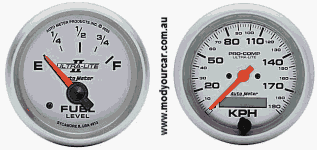
As a former high school and college physics teacher, I often had to dream up ways of showing students topics that were too fast (the speed of light) or too slow (the movement of tectonic plates) or too big (the galaxy) to pull off in class. I have also found that a few basic demonstrations in Rasch Measurement courses have helped my students better apply and remember Rasch theory and techniques.
In addition to using a ruler as Ben Wright did in Chicago, I have some added props. I went to a junkyard and purchased a speedometer and a car's fuel gauge. When I introduce measurement to my students I can pull out these props and ask participants to discuss what each device is measuring. "Is one device better than the other"?
Invariably the students comment that a speedometer works pretty well, and that as far as they know the difference between 30 mph and 35 mph is the same as the difference between 65 mph and 70 mph. And they always comment that the fuel gauge is kind of odd, in that once you fill up the car, the gauge does not seem to move very much as you drive. But when you have about a half a tank of gas, the needle seems to move more quickly with each mile driven. The speedometer is linear, but the gas gauge is non-linear!
They seem to really get it when I then float the idea that some of our measurement devices in education, medicine and other fields might sometimes act like the gas gauge. Usually I pull out a rating scale survey and place it next to the speedometer and the gas gauge. Which is it more like?
I finish up by stressing that if we want to improve what we do, we need to make sure we have gauges that mean what they say in all situations.
Recently some of my students have remarked that some cars have digital gauges that tell you how many miles you have left in your tank and that this might be an improvement over the old gauge design. Interestingly some students also mention that even if they have an accurate digital device that might say "105 miles until empty", they probably would still find themselves looking at the gauge with a needle, for it is easier to read with a quick glance. This of course ties into later topics that involve the use of devices such as Wright Maps to quickly communicate a picture of what is taking place!
William Boone. Miami University (Oxford, Ohio, USA)
 |
Teaching Rasch Measurement, W. Boone ... Rasch Measurement Transactions, 2010, 24:3 p. 1299
| Forum | Rasch Measurement Forum to discuss any Rasch-related topic |
Go to Top of Page
Go to index of all Rasch Measurement Transactions
AERA members: Join the Rasch Measurement SIG and receive the printed version of RMT
Some back issues of RMT are available as bound volumes
Subscribe to Journal of Applied Measurement
Go to Institute for Objective Measurement Home Page. The Rasch Measurement SIG (AERA) thanks the Institute for Objective Measurement for inviting the publication of Rasch Measurement Transactions on the Institute's website, www.rasch.org.
| Coming Rasch-related Events | |
|---|---|
| Jan. 16 - Feb. 13, 2025, Fri.-Fri. | On-line workshop: Rasch Measurement - Core Topics (E. Smith, Winsteps), www.statistics.com |
| Apr. 8 - Apr. 11, 2026, Wed.-Sat. | National Council for Measurement in Education - Los Angeles, CA, ncme.org/events/2026-annual-meeting |
| Apr. 8 - Apr. 12, 2026, Wed.-Sun. | American Educational Research Association - Los Angeles, CA, www.aera.net/AERA2026 |
| May. 15 - June 12, 2026, Fri.-Fri. | On-line workshop: Rasch Measurement - Core Topics (E. Smith, Winsteps), www.statistics.com |
| June 19 - July 25, 2026, Fri.-Sat. | On-line workshop: Rasch Measurement - Further Topics (E. Smith, Winsteps), www.statistics.com |
The URL of this page is www.rasch.org/rmt/rmt243g.htm
Website: www.rasch.org/rmt/contents.htm